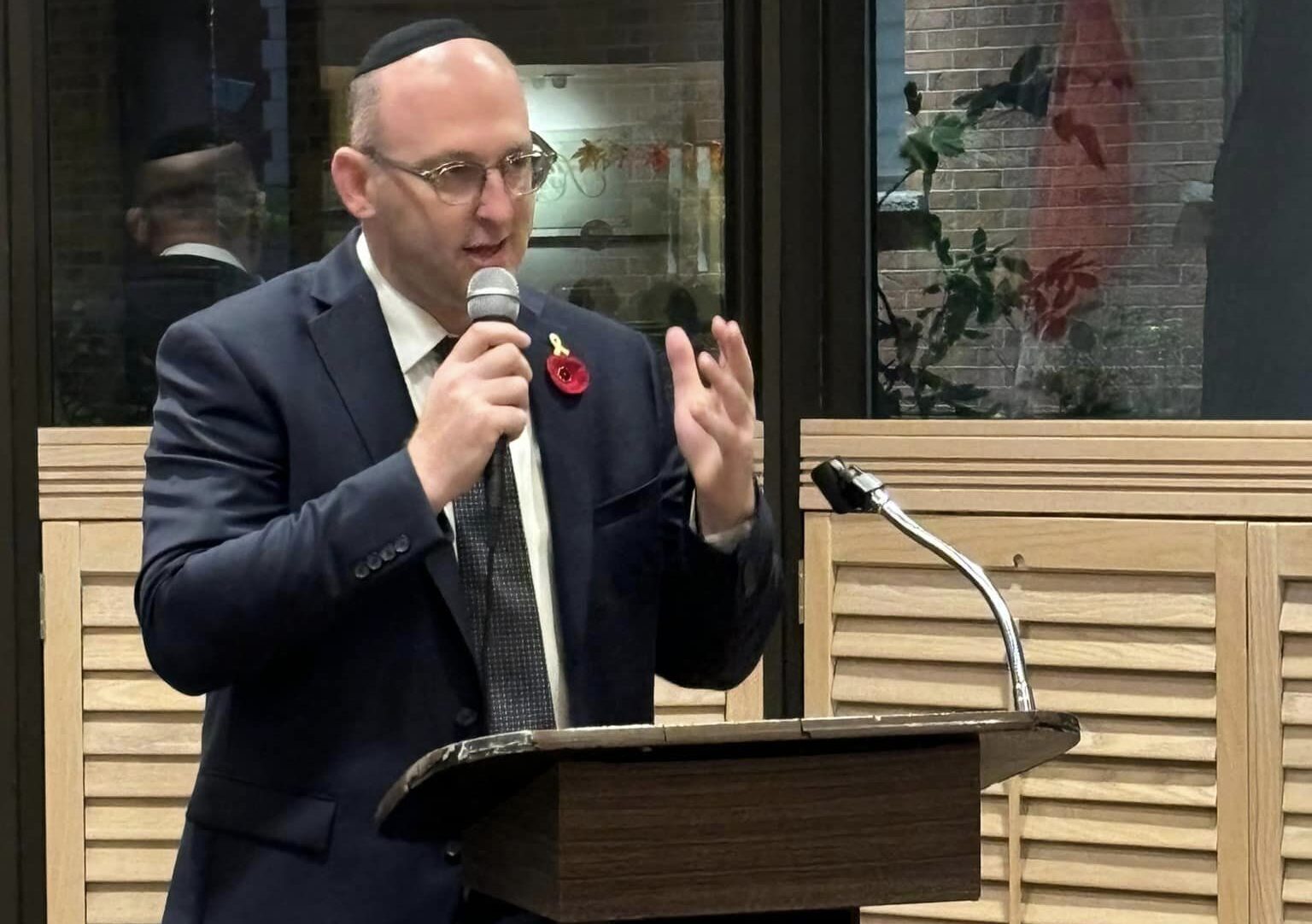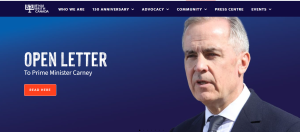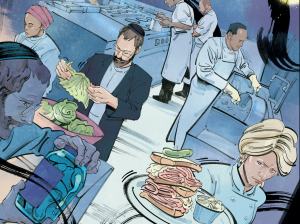The rabbi at Congregation Shaar Hashomayim has denounced a series of incidents in which bystanders going about their daily lives are singled out by Montreal police—and asked to bear responsibility for keeping scenes peaceful—rather than dedicating their attention to those causing unrest during protests.
Rabbi Adam Scheier was downtown with his family on Nov. 24, when he stopped at a local Second Cup to support the chain’s decision to sever ties with a Jewish General Hospital franchisee who performed Nazi salutes in front of Jews, and warned them about “The Final Solution” outside Concordia University three days earlier.
(After being closed for a week, the hospital cafés have reopened under new management.)
He heard the chants as a pro-Palestinian rally made its way up Stanley Street towards Sainte-Catherine, flanked by SPVM (Montreal police) officers.
This was two weeks after a protest outside Rabbi Scheier’s own synagogue on Nov. 5, where in violation of a court injunction—and in full view of police—masked individuals waving Palestinian flags shouted at attendees of an event featuring former Israeli government spokesperson Eylon Levy. (“Go back to where you came from!” and “I support Hamas!” were among the phrases reportedly heard.)
With that in mind, the rabbi stepped outside, and took out his smartphone to start recording.
Notwithstanding the lingering impact of having masked protesters shout support for terror organizations outside a synagogue in a Jewish neighborhood, Rabbi Scheier said he stuck to his usual demeanour, standing silently and recording while not engaging with protesters.
He says he was just one of many people holding up their cameras to record the passing crowd—which waved flags in his direction and recorded him in turn. After crossing to the far corner to continue recording as protesters moved eastward away from the intersection, a police officer told him to “keep moving, keep going.”
“I looked around in disbelief, because there were dozens, if not, you know, 100 people standing there on the sidewalks, all with their cameras up, all recording.”
Rabbi Scheier challenged the officer, asking him why he was singled out to leave, and the response stunned him. “He said because we can’t have a fire starting from both sides.” When asked to elaborate, he was told “you know I don’t want problems.”
That further perplexed him. “I was holding a phone up. That was it. That was the only thing I was doing, never said one word, never made eye contact with anyone, just standing there, recording. That’s it.
“The problem is that I was doing so with a kippah on my head.”
“I couldn’t stop thinking about what an injustice this was, that hatred, support for terror, the turning of our streets into a place where many don’t feel welcome, not just expressing an opposing viewpoint and doing so in a peaceful, respectful manner,” but a scenario where a police officer felt it was within his mandate “to identify a Jew and ask that Jew to vacate the premises, to vacate a public area, because a fire might start.”
Rabbi Scheier pays great tribute to police officers, calling what they do “holy work… Putting their own well-being on the line for the welfare of society or of a community.” But these types of interactions with police are “unacceptable in a free society like ours.”
He decried that protesters stand outside a house of worship“and yell and defame and verbally abuse individuals” receiving full police protection, while those who live peacefully “are not allowed to or their movement is restricted. I find that awful.”
What’s worse, said Rabbi Scheier, is that Montreal police advised hundreds of people gathered inside his synagogue to leave through the back door “to avoid problems” and then asked him personally to leave the grounds so protesters would disperse and advised him to use the back door of his home. That whole experience, he told The CJN, “and I will say this in a gentle way, was the most ‘un-Canadian’ experience I have had.”
He cites similar experiences, including encampments allowed to linger on campuses and protests shutting down schools. “That tells Jewish students ‘We can’t protect you, therefore school is closed while protests are happening’… This is incident after incident after incident in which the Jewish community is being asked to take a step back and make room for those who are spreading hate, who are promoting terrorism and are creating an atmosphere of intimidation, fear and violence in our society.”
Mount Royal MP Anthony Housefather told The CJN he raised the issue with SPVM officials in a Nov. 29 meeting with Rabbi Scheier, Rabbi Reuben Poupko, two island mayors and representatives from the Centre for Israel and Jewish Affairs (CIJA). Housefather said he told police they “need to be trained on the fact that you have a right to be visibly Jewish and in a public place in a situation like that, and also that police need to enforce the law and municipal bylaws and not merely keep the peace.”
That meeting was scheduled prior to the downtown incident to address the police response to the anti-Israel gathering outside of the synagogue on Nov. 5 and what future actions could entail. Rabbi Scheier said he has yet to “receive an apology or satisfactory explanation as to why the right of anti-Israel activists to protest seems to supersede the right of citizens to stand peacefully on the streets of our city or have unimpeded access to our buildings and homes.”
Montreal police refused to comment on the meeting or matters discussed. A statement from CIJA only said, “We meet regularly with SPVM and continue to do it and work with them.” Housefather added that he asked for the SPVM to agree to have Toronto criminal attorney and Alliance of Canadians Combatting Antisemitism founder Mark Sandler, “come train Montreal police as he has in Toronto and Vancouver.”
Rabbi Scheier said there was nothing from that meeting to report, “addressing that incident or any change in policy that might result from it.” But he also told The CJN the community is nearing a tipping point “where we’re ready to say ‘No, we have rights as human beings.’ As a father taking his children shopping downtown, I have a right to exist. I have a right to stand on the sidewalk… And please do not ask me to cede my spot in society for the sake of others who are bringing hatred into my life.”
His comments came a day after Montreal attorneys Neil Oberman, Michael Hollander and Jonathan Gordon held an online meeting to advise the city’s Jewish community on how to effectively report incidents of hate and harassment to Montreal police, with one key guidance being to document and record without engaging.
The rabbi suggests there’s “something deeper going” on with regard to comments about “both sides” and not wanting to “start a fire.” Not only does that equate protesters blocking streets and chanting with a rabbi standing quietly with a cellphone, “it’s importing an international conflict into our streets by the police, in looking at me and seeing me as a representative of a particular political opinion that I’m actually not espousing in that moment.”
Instead of being seen as a citizen taking his family shopping in his own city he says, “as somebody worthy of their protection, they’re seeing me as a protester representing a side of a conflict. And that, to me was highly offensive. I am, at my core, a human being who is representing my own interests, who has my own political opinions, and those opinions are and should be of no interest to a police officer whose job is to keep me safe.”
Meanwhile, the Montreal’s Policeman’s Brotherhood is mandating its lawyers to find legal avenues to force demonstrators to uncover their faces, union president Yves Francoeur said, calling the current situation “unacceptable.”
A week after the violent and destructive anti-NATO protests in downtown Montreal—which resulted in at least three arrests, with more expected to come—Francoeur says the measures could be achieved via municipal bylaw, provincial legislation, or changes to Canada’s Criminal Code. He has stated on more than one occasion in the past year that he and his members, increasingly and slangily being dubbed by cynical Quebecers as “des tourists” in the face of ubiquitous protests but few arrests, prefer a more robust response to unruly demonstrations.
Francoeur’s comments come just two days after Quebec premier François Legault told Montreal mayor Valérie Plante to restore order in the city, and after reports the city has spent more than $9 million on policing demonstrations related to the Middle East conflict since Oct. 7, 2023. He says while police are subject to criticism, it’s worth noting that law enforcement can only work with the tools provided for them by lawmakers.
In October, Francoeur also told French-language radio that he was flabbergasted that Montrealers have witnessed almost two dozen instances of crowds stopping in the streets of Montreal, blocking traffic to conduct mass prayers, noting that his union was among the first to support Quebec’s Bill 21 secularism law.
Author

Joel has spent his entire adult life scribbling. For two decades, he freelanced for more than a dozen North American and European trade publications, writing on home decor, HR, agriculture, defense technologies and more. Having lived at 14 addresses in and around Greater Montreal, for 17 years he worked as reporter for a local community newspaper, covering the education, political and municipal beats in seven cities and boroughs. He loves to bike, swim, watch NBA and kvetch about politics.
View all posts








